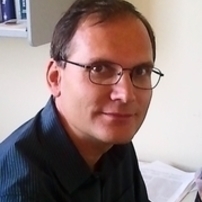P4 Developer Days is a series of live educational webinar recordings featuring different P4-related topics and presented by members of the P4 community. If you are interested in proposing a topic to present at an upcoming P4 Developer Day, please email a short abstract of your proposed topic to andy.fingerhut@gmail.com
Steffen Lindner | April 2, 2024
The P4TG traffic generator and analyzer
 Steffen Lindner is a postdoctoral researcher specialized in software-defined networking (SDN), P4, Time-Sensitive Networking (TSN), and congestion management. He studied, worked, and obtained his bachelor’s (2017), master’s (2019), and Ph.D. (2024) degrees at the University of Tuebingen.
Steffen Lindner is a postdoctoral researcher specialized in software-defined networking (SDN), P4, Time-Sensitive Networking (TSN), and congestion management. He studied, worked, and obtained his bachelor’s (2017), master’s (2019), and Ph.D. (2024) degrees at the University of Tuebingen.
We present P4TG, an open-source P4-based traffic generator (TG) which runs on the programmable Intel Tofino ASIC. In generation mode, P4TG is capable of generating traffic up to 1 Tb/s split across 10x 100 Gb/s ports. Thereby it measures rates directly in the data plane. Generated traffic may be fed back from the output to the input ports, possibly through other equipment, to record packet loss, packet reordering, inter-arrival times (IATs) and sampled round trip times (RTTs). Further, it supports VLAN, QinQ, and MPLS encapsulation. In analysis mode, P4TG measures rates on the input ports and IATs, and forwards traffic through its output ports. Existing software or P4-based traffic generators either lack the required accuracy, do not support high data rates, or do not provide sufficiently integrated measurement capabilities.
Debobroto Das Robin | August 1, 2023
Ryan Goodfellow | July 18, 2023
 Ryan Goodfellow is a networking engineer at Oxide Computer Company. He works in a small team that has built the networking foundation for a rack-scale computer from the ground up with P4 at the core. Building a computing platform around P4 has provided an in-depth understanding of the P4 language and a breadth of experience in the technical machinery and ecosystem that must exist around the language to innovate successfully with P4. Ryan’s current work in P4 is centered around the idea that for a language ecosystem to thrive, the challenges at the hardware-software interface must be open to the engineering teams building systems on the language. To this end, he’s been working on an open ISA for P4 to allow for full-stack open-source compilers to be created.
Ryan Goodfellow is a networking engineer at Oxide Computer Company. He works in a small team that has built the networking foundation for a rack-scale computer from the ground up with P4 at the core. Building a computing platform around P4 has provided an in-depth understanding of the P4 language and a breadth of experience in the technical machinery and ecosystem that must exist around the language to innovate successfully with P4. Ryan’s current work in P4 is centered around the idea that for a language ecosystem to thrive, the challenges at the hardware-software interface must be open to the engineering teams building systems on the language. To this end, he’s been working on an open ISA for P4 to allow for full-stack open-source compilers to be created.
At Oxide, we’re big proponents of both open-source and programmable networking. In this talk, I’ll present our P4 compiler x4c, and how we leverage the flexibility it provides us to build a product with P4 at the core while still maintaining test and CI-driven workflows. One of the primary challenges of building a product around P4 is integrating P4-programmable elements into a broader hardware/software system and testing at the scale and complexity the system is designed to operate at in a virtualized setting, as doing so physically is not economically feasible.
Fabian Ruffy | December 6, 2022
P4Testgen – An Extensible Test Oracle
for P4
 Fabrian Ruffy is a PhD candidate in the systems lab at New York University, a part-time research assistant at Intel, and a member of the P4 Technical Steering Team (TST). He works with Anirudh Sivaraman on problems related to data center networking, more specifically programmable networks. Previously, he was a Master’s student in the Networks, Systems, and Security lab of the University of British Columbia, where he was advised by Ivan Beschastnikh.
Fabrian Ruffy is a PhD candidate in the systems lab at New York University, a part-time research assistant at Intel, and a member of the P4 Technical Steering Team (TST). He works with Anirudh Sivaraman on problems related to data center networking, more specifically programmable networks. Previously, he was a Master’s student in the Networks, Systems, and Security lab of the University of British Columbia, where he was advised by Ivan Beschastnikh.
Mihai Budiu | March 1, 2022
Understanding P416 Open-Source Compiler, Part 2

Mihai Budiu is a research at VMware Research. He holds a holds a Computer Science, Ph.D, from Carnegie Mellon University and after graduate school was a researcher at Microsoft Research in Silicon Valley for 10 years. When the Microsoft lab was dismantled, in the fall of 2014, he joined Barefoot Networks. His role was to help design and implement a new version of the P4 language, which became later known as P4-16. He initiated (with Chriss Dodd) the development of the open source P4-16 compiler infrastructure. After Barefoot he joined VMware Research. At VMware he has continued to support the P4 language as a core contributor to the open-source compiler and later as a co-chair of the P4 Language Design Working Group.
Understanding the Open-Source P416 Compiler, Part 1

Mihai Budiu is a research at VMware Research. He holds a holds a Computer Science, Ph.D, from Carnegie Mellon University and after graduate school was a researcher at Microsoft Research in Silicon Valley for 10 years. When the Microsoft lab was dismantled, in the fall of 2014, he joined Barefoot Networks. His role was to help design and implement a new version of the P4 language, which became later known as P4-16. He initiated (with Chriss Dodd) the development of the open source P4-16 compiler infrastructure. After Barefoot he joined VMware Research. At VMware he has continued to support the P4 language as a core contributor to the open-source compiler and later as a co-chair of the P4 Language Design Working Group.